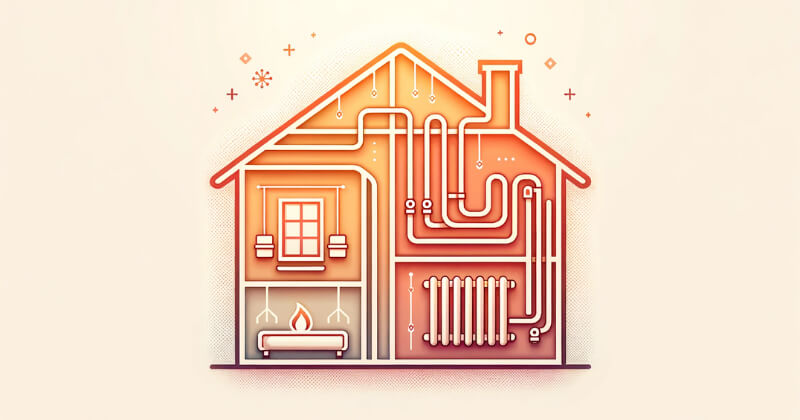It’s a decision that goes beyond just comfort; it’s about creating an environment that speaks to the soul of your home.
In the UK, where the weather can be as unpredictable as a roll of the dice, having an efficient and reliable central heating system isn’t just a luxury, it’s a necessity.
As you curl up with a hot cup of tea, pondering over how to keep your home snug and warm, you’ll find that the world of central heating systems is as varied as it is fascinating.
From the hum of a gas boiler to the innovative electric radiators, each system has its own story to tell. Some whisper tales of efficiency and eco-friendliness, while others boast about their power and prowess.
Why is choosing the right central heating system important to you?
Central heating systems are a vital component of UK homes, ensuring comfort and warmth during colder months. The choice of a central heating system depends on various factors like the size of your home, energy efficiency needs, and personal preferences.
we’re not just talking about heating your home; we’re exploring how to elevate your living space into a haven of warmth and efficiency. Whether you’re nestled in a quaint countryside cottage or a sleek city apartment, understanding the types of central heating systems available in the UK is key to making an informed decision.
So, let’s embark on this journey together, unraveling the mysteries of central heating and discovering the perfect system for your abode.
Boiler Prices
In the UK, the cost of central heating systems and boilers can vary significantly based on multiple factors. For instance, the type of boiler (combi, system, or regular), its brand, size, and efficiency rating all contribute to the overall price. On average, a new boiler installation can range from £1,500 to £3,500, with combi boilers typically at the lower end and system or regular boilers at the higher end of this range. This guide from compare boiler quotes can give you a better understanding of central heating boiler prices. Some additional costs, such as installation charges, may vary depending on the complexity of the installation and location.
Factors like warranties, energy efficiency ratings, and any additional features can also influence the price. It’s crucial for homeowners to consider not just the upfront costs but also the long-term energy efficiency and potential savings on heating bills when investing in a central heating system or boiler in the UK.
Wet Central Heating Systems
These are the most common in UK homes. In this setup, a boiler heats water, which is then pumped through pipes to radiators throughout the house. Wet systems can also provide hot water for taps. They’re typically powered by gas but can also operate on oil, LPG, or biofuels. Wet systems are efficient and can be tailored for tankless (on-demand) or tank-based hot water supply.
Electric Central Heating Systems
Electric central heating is gaining popularity due to its simplicity and efficiency. These systems use electric radiators or infrared panels, which heat objects and people directly rather than warming the air. This method is known for reducing cold spots and draughts. Electric underfloor heating is another option, offering a consistent warmth from the floor upwards.
Warm Air Systems
Less common in the UK, warm air systems work by heating air that’s then circulated throughout the home via ducts. These systems are more frequently found in older properties and can provide both heating and cooling. However, they require substantial space for ductwork and are generally installed during the construction phase of a home.
District Heating
A less common but growing option, district heating involves producing heat at a central location and distributing it to multiple homes in an area. This system eliminates the need for individual boilers and can be more energy-efficient and sustainable.
Biomass Heating Systems
Biomass systems use renewable sources like wood pellets or agricultural waste to generate heat. They’re eco-friendly, producing low emissions, but require more space and regular maintenance.
Oil Central Heating and LPG
These systems are similar to gas central heating but use oil or liquid petroleum gas to heat water. They are particularly reliable in areas where the gas network isn’t available but need regular maintenance and careful storage of fuel.
System Boilers
Ideal for larger homes with multiple bathrooms, system boilers use an extra tank to store hot water, allowing simultaneous supply to different parts of the house. They are economical but require more space for the tank.
Combi Boilers
Combi boilers are ideal for smaller sized homes with less taps and showers to be powered at once, their compact design takes up less space in your home, and they are able to produce hot water on demand, combis are one of if not the most popular heating system currently in the UK.
Factors to Consider
Choosing the right central heating system involves considering your home’s size, existing insulation, energy efficiency needs, and maintenance preferences. Gas central heating is widely used due to its cost-effectiveness and ease of maintenance, but electric systems are becoming more popular due to their high efficiency and lower environmental impact.
Biomass heating offers a sustainable alternative, while oil and LPG systems are reliable choices for rural areas.
In conclusion, the best central heating system for your UK home depends on your specific needs and circumstances. Gas and electric systems are common, with alternatives like biomass, oil, and LPG offering viable options in certain situations.
It’s important to weigh the pros and cons of each system, considering factors like installation costs, running expenses, maintenance requirements, and environmental impact.
For a comprehensive understanding and to make an informed decision about the best central heating system for your home, consider consulting with a heating specialist or a professional installation service.








